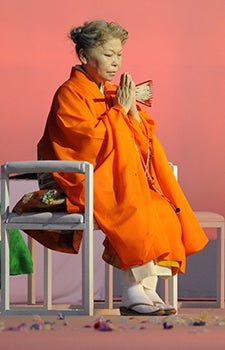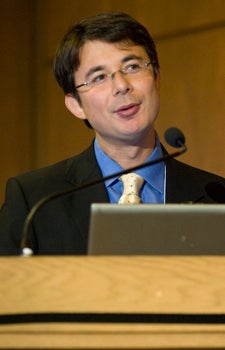A Deeper Connection
The Shinnyo-en Buddhist order has made a historic $6.6 million gift for the study of Japan to the University of Southern California. The newly named USC Shinso Ito Center for Japanese Religions and Culture was established in 2011 to serve as a hub for the study of Japan at the university and the new name honors Shinnyo-en’s current leader, Shinso Ito.
Shinnyo-en’s support for USC’s center represents one of the largest gifts ever given to a center dedicated to the study of Japan in North America. Shinnyo-en is an international Buddhist order of nearly a million practitioners that promotes an inclusive and innovative pathway to enlightenment, the values of peaceful coexistence with other religions and a culture of service to others in need.
“The USC Shinso Ito Center for Japanese Religions and Culture carries a deep-seated mission to use the teaching of religion and culture to actively engage our students,” said Steve Kay, dean of the USC Dornsife College of Letters, Arts and Sciences, which houses the center. “But it is because of philanthropic gestures such as this that USC can be a leader among American universities in contributing to the strengthened partnership with Japan that I know we all envision for the future.”
The gift will enhance the center’s mission to promote the study of Japanese religions and culture at USC, and in the broader intellectual community of Japanese studies. Founded under director Duncan Williams, chair of USC Dornsife’s School of Religion, the center seeks to support the study of Japan’s culture, history and contemporary relevance through translational research projects.

Her Holiness Shinso Ito, head priest of the Shinnyo-en Buddhist order. Photo courtesy of Shinnyo-en.
“Shinnyo-en deeply appreciates the commitment of the USC Center for Japanese Religions and Culture for its deep and sensitive explorations of many aspects of Japanese culture through the study of international relations, society, the arts, media and religion,” said the Rev. Minoru Shitara, director of Shinnyo-en’s international affairs department. “Shinnyo-en views this support of the center as an expression of our common purpose with USC to educate people from diverse backgrounds to become effective agents for understanding, peace and harmony in the world.”
Williams said he is grateful to Her Holiness Shinso Ito and to all Shinnyo-en leaders and members for believing in the work of the USC Shinso Ito Center.
“With this generous gift, the center will continue to deepen the understanding between the peoples of Japan and America by promoting study of Japan, study in Japan and study with Japan,” Williams said. “And, in its work, the center hopes to bring to the world the wisdom and the compassion that Her Holiness teaches.”
The center is one of the most active centers for Japan studies in the nation, hosting weekly events and seminars that bring scholars from Japan and around the world in dialogue with students, thought leaders and the general public. Current research directed by the center focuses on various aspects of Japanese religions and cultures while functioning like a think tank. Projects examine the future of Japan, such as how its aging society affects labor, taxation, pension and health care issues.
The center’s Hybrid Japan Innovation Lab studies Japan’s role on the global stage in the 21st century. The Hapa Japan Database Project examines hapa, or multiethnic, Japanese populations throughout history and current representations of mixed-ethnicity Japanese identity.
Last April, the center hosted a five-day festival called “Hapa Japan” that celebrated and educated more than 4,000 people from around the world about global multiracial Japanese. This year, it will bring together top immigration experts to consult with Japan’s primary immigration policy adviser.

Duncan Williams, founding director of the USC Shinso Ito Center for Japanese Religions and Culture and chair of USC Dornsife’s School of Religion. Photo courtesy of Duncan Williams.
“We look forward to building upon our research and developing more events with high levels of impact, not only in academia, but for the general public and with government policymakers,” Williams said.
Political leaders have already taken note of the gift’s significance.
“Today’s historic gift of $6.6 million from the Shinnyo-en organization to the University of Southern California represents an important moment in the relationship between the United States and Japan,” U.S. Ambassador to Japan Caroline Kennedy said. “Promoting cross-cultural ties and mutual understanding between the U.S. and Japan is more important now than ever before.”
Shinnyo-en’s gift represents another milestone in USC’s current fundraising initiative — the Campaign for the University of Southern California, which seeks to raise $6 billion or more in private support from individual donors, foundations and corporations.
At the time of its launch, the campaign had the largest fundraising goal ever announced in higher education. In three years, the campaign has already raised more than $3 billion.